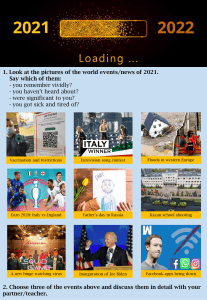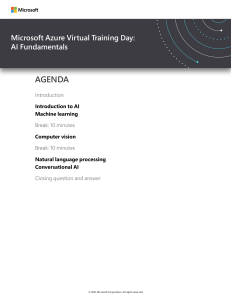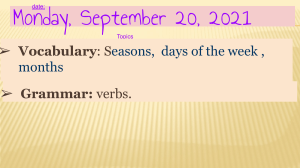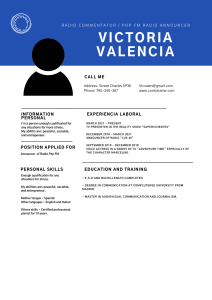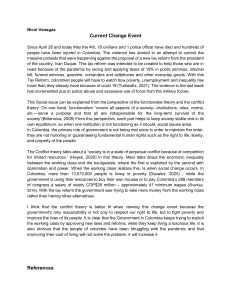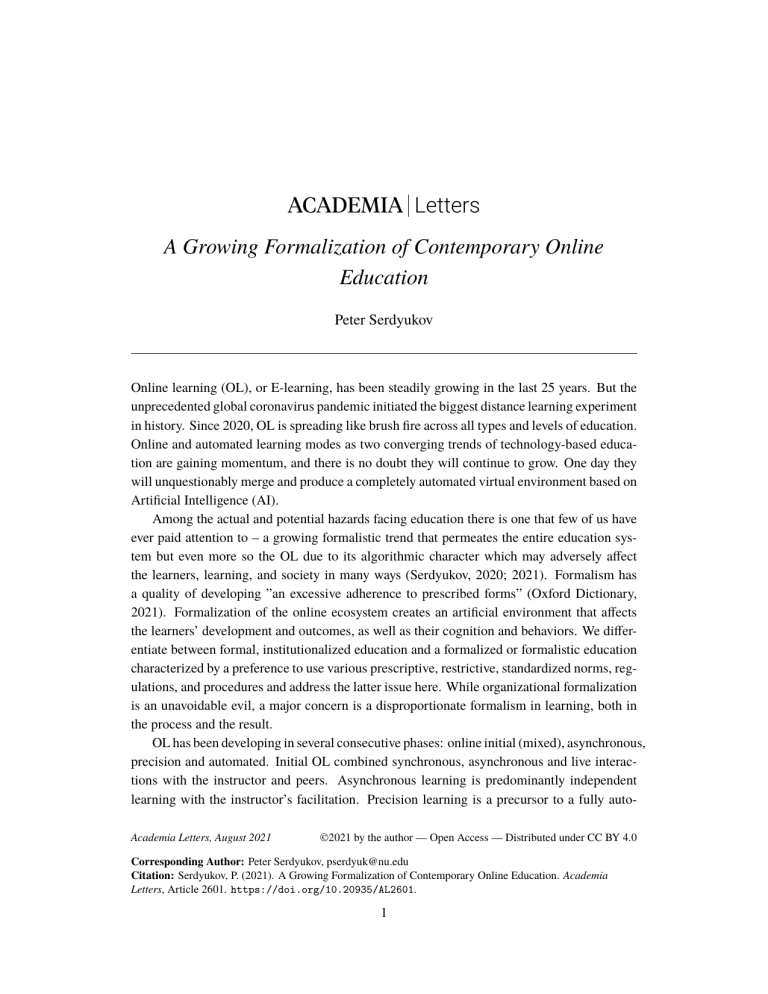
ACADEMIA Letters A Growing Formalization of Contemporary Online Education Peter Serdyukov Online learning (OL), or E-learning, has been steadily growing in the last 25 years. But the unprecedented global coronavirus pandemic initiated the biggest distance learning experiment in history. Since 2020, OL is spreading like brush fire across all types and levels of education. Online and automated learning modes as two converging trends of technology-based education are gaining momentum, and there is no doubt they will continue to grow. One day they will unquestionably merge and produce a completely automated virtual environment based on Artificial Intelligence (AI). Among the actual and potential hazards facing education there is one that few of us have ever paid attention to – a growing formalistic trend that permeates the entire education system but even more so the OL due to its algorithmic character which may adversely affect the learners, learning, and society in many ways (Serdyukov, 2020; 2021). Formalism has a quality of developing ”an excessive adherence to prescribed forms” (Oxford Dictionary, 2021). Formalization of the online ecosystem creates an artificial environment that affects the learners’ development and outcomes, as well as their cognition and behaviors. We differentiate between formal, institutionalized education and a formalized or formalistic education characterized by a preference to use various prescriptive, restrictive, standardized norms, regulations, and procedures and address the latter issue here. While organizational formalization is an unavoidable evil, a major concern is a disproportionate formalism in learning, both in the process and the result. OL has been developing in several consecutive phases: online initial (mixed), asynchronous, precision and automated. Initial OL combined synchronous, asynchronous and live interactions with the instructor and peers. Asynchronous learning is predominantly independent learning with the instructor’s facilitation. Precision learning is a precursor to a fully autoAcademia Letters, August 2021 ©2021 by the author — Open Access — Distributed under CC BY 4.0 Corresponding Author: Peter Serdyukov, pserdyuk@nu.edu Citation: Serdyukov, P. (2021). A Growing Formalization of Contemporary Online Education. Academia Letters, Article 2601. https://doi.org/10.20935/AL2601. 1 mated learning using continuous, pointed assessment to ensure effective learning. Automated learning makes the instructor obsolete. An online course is usually based on a Learning Management System (LMS) and has a formal structure that shapes and regulates the student’s learning procedure. This procedure is formal: students perform only the actions available in the course shell which incorporates a specified number of possible routes and outcomes. Course content is based on structured, pre-programmed learning materials and presented in a well-organized, often adapted, and easily digestible form. The course has a clear, straightforward structure ensuring effortless navigation, unambiguous instructions and tasks, transparent expectations, benchmarks and guidelines, and well-defined evaluation criteria (e.g., rubrics). Student performance routine in the course directed by a rigid trajectory, behavioral patterns, and fixed tasks contributes to the formalization of the background (knowledge and experiences), reactions to the instructional prompts (in patterns, quantity, quality, and time), performance (learning preferences, diligence, and actions), and preset learning outcomes. Students are attracted to OL primarily by its convenience (Christensen, Eyring, 2011; Cole, Shelley, & Swartz, 2014). Formalized education helps to satisfy this urge for convenience. Clicker or push-button learning in “click-based” or “keyboard-based” institutions is a metaphor for convenience education. Colleges, especially for-profit and even non-for-profit, further exacerbate the situation. They all want to make their programs “student-friendly” and accommodating to increase enrollments and reduce attrition. A growing tendency towards asynchronicity of online learning driven by many private for-profit and even non-for-profit institutions is grounded largely in business considerations – growing enrollments by making OL more accessible and convenient. A remarkably high attrition rate in online institutions, however, a - 40-80% (Bawa, 2016; Chisirtensen, Spackman, 2017) indicates many students are not ready for this type of learning. The most obvious explanation is, besides students’ personal issues, a poor previous education, which has not provided students with effective learning skills, fundamental knowledge, and desirable attitudes (ACT, 2018; Dynarski, 2018). Another is students’ unpreparedness for the online format: many are experiencing difficulties when learning online - technical, psychological, and pedagogical (Bettinger & Loeb, 2017). Students in an asynchronous format find themselves within a formalized learning environment where they have limited opportunities for informal, creative, and collaborative work, personal communication, and miss socioemotional benefits of synchronous and live learning. Online educators and society expect students to be independent, autonomous, self-directed, self-sufficient, creative, and highly motivated learners. Yet, many of them rely on the formal, straightforward course structure and unambiguous organization of the class, direct leadership, strong support, and even pressure from the instructor. The need for an externally imposed formal structure, organization, Academia Letters, August 2021 ©2021 by the author — Open Access — Distributed under CC BY 4.0 Corresponding Author: Peter Serdyukov, pserdyuk@nu.edu Citation: Serdyukov, P. (2021). A Growing Formalization of Contemporary Online Education. Academia Letters, Article 2601. https://doi.org/10.20935/AL2601. 2 and obligation in online courses might be explained by students’ lack of confidence in their abilities to accomplish their learning on their own. Precision learning is the next phase of the formalization of education which leads to the complete automation of the learning. It is an evidence-based approach that uses precise methods of data analytics to capture valid and reliable information to drive student success and improve outcomes using adaptable algorithms. Automation of education is another growing trend (Hitchcock, 2019; Bennett, 2020), which morphs into robotization. It is expected AI-based learning systems will replace live instructors (Grace, Salvatier, et al., 2018). Formalization is thus a prerequisite for automation of the learning process as the computer can operate only with formal objects using algorithms. Online education, being a disruptive innovation, opens new opportunities for learning while negating the old and regressive; at the same time, it may reject what was good and bring about some unexpected and undesirable negative effects, formalization being one of them. We see at least five major reasons for the concern about excessive formalization in learning based on digital technology: • Disconnect from real life; • Inadequate learning outcomes; • Social deprivation; • Health, cognition, and identity hazards; • Conditioning of students and other social threats. Do we know what happens to the human brain in a formalized environment? Based on the activity theory, we know consciousness is not only closely interrelated with the learner’s activity but is also shaped by the activities the learner is engaged in (Leontiev, 1978; Bedny & Meister, 1997; Rubinstein, 2002). We can then confidently assume that learners in a formalized online environment develop consciousness, cognition, worldviews and characteristics different from the ones shaped in a traditional, socialized, non-computerized school environment. Formalistic, standardized machine-based education imposes certain norms and routines of learning which can modify consciousness to a predetermined pattern and condition students into certain actions. This creates a rift between a free, active, creative, investigative mind and a passive, dependent, filled one. The comedian and star of Blackadder, Mr. Bean (Rowan Atkinson) said addressing contemporary culture: “The problem we have online is that an algorithm decides what we want to see, which ends up creating a simplistic, binary view of society” (Lloid, 2021). Academia Letters, August 2021 ©2021 by the author — Open Access — Distributed under CC BY 4.0 Corresponding Author: Peter Serdyukov, pserdyuk@nu.edu Citation: Serdyukov, P. (2021). A Growing Formalization of Contemporary Online Education. Academia Letters, Article 2601. https://doi.org/10.20935/AL2601. 3 While we cannot and should not stand in the way of technological innovations, we, the people, must direct the process, not become submissive to the machines for the sake of convenience, effectiveness, or profit. It is vital for the education system, teachers, and students to accept a comprehensive, pedagogic-centric view of higher education, not a techno-centric one. Educators must lead the technological revolution in education, instead of technology dictating what and how to teach and to learn. We can counteract formalization with a holistic, humanistic view of education and the world. We must make it clear where and when the OL works, and where it does not. We cannot let go of the humanitarian aspect of education in favor of technology, nor deprive online learners of informal social learning. Online educators should make all efforts to engage students in communication, interaction, collaboration, and cooperation; integrate inquiry, discovery, and problem-solving approaches and offer meaningful tasks; facilitate their becoming independent, critically minded, creative individuals. Technology should not replace human communication but complement it. True learning happens through seeking and finding, trial and error, not following a formal, predetermined route. It is critical to integrate a variety of real-life, live experiences in OL - modeling genuine situations and using authentic case studies, as well as taking students out of the OL box into the outside word. Learning must be all-around and connected to real life. Although a certain level of formalization is necessary for the educational system to function efficiently, we must rely less on formal, often artificial rules, standards, and strict administrative control to allow for more choices and freer, creative student performance in OL, as well as more independence for educators. References ACT (2018). The condition of college and career readiness. National 2018 American College Testing (ACT). http://www.act.org/content/dam/act/unsecured/documents/cccr2018/ National-CCCR-2018.pdf Bawa, P. (2016). Retention in online courses: Exploring issues and solutions – a literature review. SAGE Open, 6(1). http://doi.org/10.1177/2158244015621777 Bedny, G. Z. & Meister, D. (1997). The Russian Theory of Activity: Current Applications to Design and Learning, Mahwah, NJ, Lawrence Erlbaum Associates. Bennett, M. (2020). Automation of Teaching. https://medium.com/qmind-ai/automation-ofteaching-7f63d7b398f5 Bettinger, E. and Loeb, S. (2017). Promises and pitfalls of online education. Brookings, Academia Letters, August 2021 ©2021 by the author — Open Access — Distributed under CC BY 4.0 Corresponding Author: Peter Serdyukov, pserdyuk@nu.edu Citation: Serdyukov, P. (2021). A Growing Formalization of Contemporary Online Education. Academia Letters, Article 2601. https://doi.org/10.20935/AL2601. 4 https://www.brookings.edu/research/promises-and-pitfalls-of-online-education/ Christensen, C., Eyring, H. (2011). The innovative university: Changing the DNA of higher education from the inside out. San Francisco: Jossey-Bass. https://www.sciencedirect. com/science/article/pii/ Christensen, S., Spackman, J. (2017). Dropout rates, student momentum, and course walls: A new tool for distance education designers. Journal of Educators Online, 14(2), pp 1-16. https://files.eric.ed.gov/fulltext/EJ1150708.pdf. Cole, M., Shelley, D., and Swartz, L. (2014). Online instruction, E-Learning, and student satisfaction: A three-year study. International Review of Research in Open and Distance Learning 15(6):111-131. DOI:10.19173/irrodl.v15i6.1748. Dynarski, S. (2018). Online courses are harming the students who need the most help. New York Times, 01/19/2018. https:// www.nytimes.com/2018/01/19/business/online-coursesare-harming-the-students-who-need-the-most-help.html Grace, K., Salvatier, J., Dafoe, A., Zhang, B., Evans, O. (2018). Computer Science: Artificial Intelligence. Cornell University. https://arxiv.org/pdf/1705.08807.pdf Hitchcock, J. (2019). Why Automation Makes eLearning the Future of Education. Lambda Solutions. Blog. https://www.lambdasolutions.net/blog/why-automation-makes-elearningthe-future-of-education Leontiev, A. (1978). Activity, Consciousness and Personality. Englewood Cliffs, N.J.: Prentice-Hall. Oxford English and Spanish Dictionary (2021). Lexico. Powered by Oxford. https://www. lexico.com/definition/formalism Lloyd, A. (2021), Rowan Atkinson Compares Cancel Culture to ‘medieval Mob Looking for Someone to Burn’, Entertainment Reporter, Tue, January 5, 2021. https://news.yahoo. com/rowan-atkinson-cancel-culture-103119505.html.Rubinstein, S. (2002). Foundations of general psychology (in Russian). St. Peterburg: Peter publishers. Serdyukov, P. (2020). Against Formalistic Trend in E-Learning. Proceedings of Innovate Learning Summit 2020, Nov. 03, 2020. Association for the Advancement of Computing in Education (AACE). (pp. 637-647). https://www.learntechlib.org/p/218859/ Academia Letters, August 2021 ©2021 by the author — Open Access — Distributed under CC BY 4.0 Corresponding Author: Peter Serdyukov, pserdyuk@nu.edu Citation: Serdyukov, P. (2021). A Growing Formalization of Contemporary Online Education. Academia Letters, Article 2601. https://doi.org/10.20935/AL2601. 5 Serdyukov, P. (2021), Formalism in online education, Journal of Research in Innovative Teaching & Learning, Vol. 14 No. 2, pp. 118-132. https://doi.org/10.1108/JRIT-02 Academia Letters, August 2021 ©2021 by the author — Open Access — Distributed under CC BY 4.0 Corresponding Author: Peter Serdyukov, pserdyuk@nu.edu Citation: Serdyukov, P. (2021). A Growing Formalization of Contemporary Online Education. Academia Letters, Article 2601. https://doi.org/10.20935/AL2601. 6
